Slavery in the UK reports
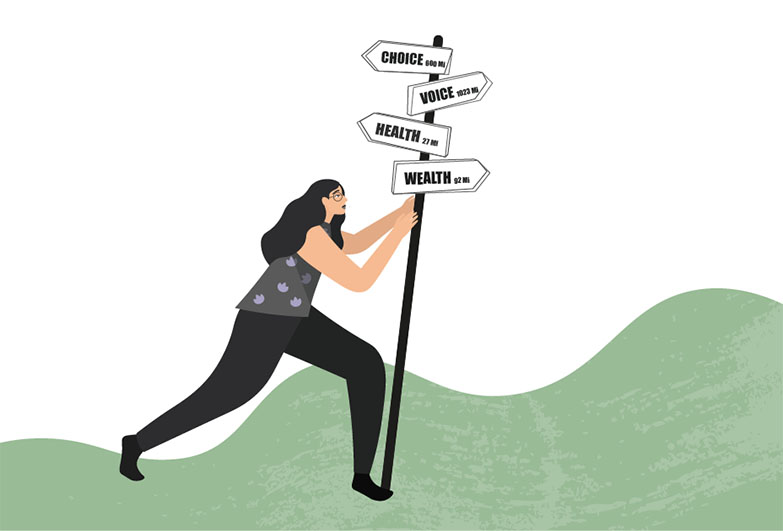

Assessing the Modern Slavery Impacts of the Nationality and Borders Act: One Year On
This is a summary of the report ‘Assessing the Modern Slavery Impacts of the Nationality and Borders Act 2022: One Year On’, based on research conducted by the British Institute of International and Comparative Law (BIICL) in partnership with the Human Trafficking Foundation (HTF) and the Anti-Trafficking Monitoring Group (ATMG). The project was funded by the Modern Slavery and Human Rights Policy and Evidence Centre (Modern Slavery PEC) through its Commissioned Research mechanism.
The Modern Slavery and Human Rights Policy and Evidence Centre is funded by the Arts and Humanities Research Council (AHRC), part of UK Research and Innovation (UKRI). The views expressed in the summary and the full report are those of the authors and not necessarily of the Modern Slavery PEC or AHRC.
‘Illegal Migration’ Bill briefing – House of Lords Committee Stage
The Anti-Trafficking Monitoring Group provides a detailed overview of the UK Government’s proposed “Illegal Migration” Bill. The ATMG raise deep concerns about the government’s proposed ‘Illegal Migration Bill’, which targets some of the most vulnerable groups in our society, including but not limited to, those seeking asylum, victims and survivors of trafficking and modern slavery, including separated children and those with families. The ATMG reject this Bill and urge the parliament to reject it in its entirety.
Joint Civil Society Briefing - Illegal Migration Bill
Joint civil society briefing for the House of Lords second reading – This joint civil society briefing for the House of Lords second reading of the Bill is co-written and approved by signatory civil society organisations. Anti-Slavery International has deemed this bill as cruel, unworkable and inhumane, and therefore unamendable. The Bill undermines our moral and legal obligations to victims of trafficking, refugees, and asylum seekers. Due to specialist sector experience and expertise, organisations have signed the parts of the briefing within their remit but that does not imply disagreement with the other parts.
Written evidence submission on Batteries for Electric Vehicle Manufacturing
Written evidence submitted by Anti-Slavery International to the Business, Energy and Industrial Strategy Committee in regarding Batteries for Electric Vehicle Manufacturing.
Anti-Slavery International welcomes the Business, Energy and Industrial Strategy Committee’s enquiry, which recognises the important role of electric vehicles (‘EV’) in the UK Government’s vital journey to net zero. However, we urge the Committee to recognise and assess the risk of the use of forced labour of Uyghurs and other Turkic and Muslim-majority peoples in the EV industry. Thus, this submission focuses on the question in the Call for Evidence “What are the risks to the UK automotive industry of not establishing sufficient battery manufacturing capacity in the UK?”
Written evidence submission on the risk of forced labour usage in critical minerals extraction
Written evidence submitted by Anti-Slavery International to the Foreign Affairs Committee to the Critical Minerals enquiry.
Anti-Slavery International welcomes the Foreign Affairs Committee’s enquiry, which recognises the important role of critical minerals in the UK Government’s green transition. In this enquiry, we urge the Committee to recognise and assess the risk of the use of forced labour of Uyghurs and other Turkic and Muslim-majority peoples in the mining and processing of critical minerals and manufacturing of
inputs made with critical minerals.
Thus, this submission focuses on the questions in the Call for Evidence which relate to responsible sourcing, diversification of supply chains and the role of the FCDO.
Written Evidence submitted by the Anti-Trafficking Monitoring Group
In written evidence to the Home Affairs Select Committee, the ATMG outlines deeps concerns on developments affecting human trafficking and modern slavery in the United Kingdom through the proposed “Illegal Migration” Bill.
Briefing on the Illegal Migration Bill
This briefing on the new Illegal Migration Bill brings together the core concerns of several leading modern slavery charities across the whole of the UK. Highlighting how we view this legislation as costly, unworkable and deeply inhumane; and urging the government to scrap this plan immediately.
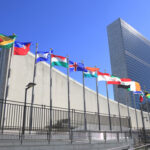
As UN Experts express alarm, coalition calls on the Government to end hostility towards survivors of trafficking and modern slavery
Today, UN experts expressed alarm at the UK Government’s use of unevidenced claims and sensationalist language towards survivors of trafficking and modern slavery, stating these attacks on the credibility of survivors and their legal representatives have a “chilling effect.” Following this release, twenty one anti-slavery organisations have released a statement calling on the Government to end its roll-back of rights and protection for survivors, and recommit to support, assistance and safeguarding for all victims of this grave crime.

One day at a time: reviewing the Recovery Needs Assessment (RNA) (2022)
“One day at a time” looks at the experience of the Recovery Needs Assessment (RNA) process. It charters the first-hand experiences of, not only those on the receiving end of support, but also the experiences of Modern Slavery Victim Care Contract (MSVCC) support providers, along with, support workers outside of the MSVCC.
Joint UN universal periodic review submission: trafficking and modern slavery in the UK (2022)
Research and analysis from the anti-trafficking sector has demonstrated the considerable shortcomings within the UK’s anti-trafficking framework, failing victims and survivors of trafficking.
The UK government has tended to view trafficking and modern slavery as a discrete form of abuse rather than existing at the extreme end of a continuum of exploitation. Working conditions must be improved generally to avoid situations degrading to the stage where they amount to human trafficking. Strengthening the labour market enforcement can help to embed a model based on proactive protection rather than simply redress once a situation has degraded to a sufficient level of severity.
This joint submission looks at the impacts of the UK’s immigration enforcement-centred approach, current obstacles in the identification and protection of victims of trafficking and modern slavery and provides a series of recommendations.
UN universal periodic review submission: migrant domestic workers in the UK (2022)
Migrant domestic workers in the UK, the majority of whom are women that live in their employer’s household, continue to suffer from widespread abuse and exploitation, including situations of trafficking and modern slavery
This is a joint submission by Anti-Slavery International, Focus on Labour Exploitation (FLEX), Kalayaan, Kanlungan Filipino Consortium, and the Voice of Domestic Workers. The submission focuses on abuse and exploitation, including trafficking and modern slavery, of migrant domestic workers in the UK.
The Overseas Domestic Worker visa increases vulnerability to exploitation because it restricts migrant domestic workers to a non-renewable six-month visa, against the recommendations of an independent review commissioned by the Government itself3. The inability to renew the visa renders the right to change employer inaccessible in practice and leaves migrant domestic workers to face abuse and exploitation with no escape route. It also obstructs access to justice and remedy when abuse occurs. New protections for migrant domestic workers announced by the Government in 2016 have either been dropped altogether or are not being implemented in practice.
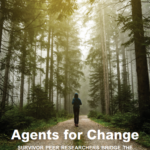
Agents for change: survivor peer researchers bridge the evidence and inclusion gap (2020)
Agents for Change is a briefing that shares reflections on the lessons and challenges of a small research team originally formed to conduct research on long-term outcomes for survivors of slavery in the UK in 2020. The team consisted of three women with lived experience of modern slavery and the Anti-Trafficking Monitoring Group (ATMG). Co-written by survivors and non-survivors of slavery or exploitation, this briefing shares collective and individual reflections on the process of working and learning together to date.
Access to work for survivors of slavery to enable independence and sustainable freedom
In order for survivors of modern slavery to recover from their exploitation, it’s essential the UK provides meaningful options to help them. This includes providing options to build independence and sustainable freedom through work, as well as through education, counselling and access to legal justice. This is a simple, achievable ask, which would do much to help survivors to move on from exploitation and to rebuild their lives. This report, produced by a coalition of organisations including Anti-Slavery International, examines the harm caused by denying survivors the right to work, as well as offering recommendations to make sure the National Referral Mechanism is reformed to allow people within the system to access work.
Joint briefing: Subsistence payments and legal aid eligibility for victims of trafficking: accessing one entitlement to lose another
People who are in the National Referral Mechanism for identifying victims of trafficking (NRM) are ‘entitled’ to legal aid. However legal aid is also means tested. This means not everyone in the NRM is able to access legal aid in practice. This poses a significant barrier to justice for people who are not eligible and denies them a key entitlement. We recommend that being in the NRM should also passport you through the legal aid income and capital tests. This would mean that everyone in the NRM would be able to access legal aid.
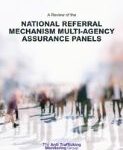
National Referral Mechanism multi-agency assurance panels: a review
This briefing reviews the provisions of the recently established Multi-Agency Assurance Panels (MAAPs) to date, assessing the extent to which they contribute to robust and transparent decision-making in the NRM. It focuses on the practical function of the MAAPs based on a survey conducted by ATMG in 2019, and feedback from 8 panellists. It goes on to highlight how this new approach to decision-making has revealed poor information sharing practices between relevant bodies, therefore undermining panel members’ ability to quality assure second stage negative decisions. In addition, it asks questions about victim support provisions more widely, especially for those engaging with the criminal justice system.
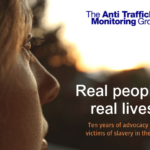
Real lives, real people: ten years of advocacy for victims of slavery in the UK
ATMG, Anti-Slavery International.
This report aims to tell the story of how and why the Anti-Trafficking Monitoring Group (the ATMG) was formed in 2009, and the impact it has had over the last decade. It also aims to illustrate the coalition as a model for good practice in holding governments around the world to account through ‘critical friendship’. Over a decade, the ATMG’s approach has sought to question the UK Government’s efforts to combat slavery and trafficking, while at the same time offering a positive critique of their actions in order to improve the protection of victims of slavery and their rights.
Joint submission to the Group of Experts on Action against Trafficking in Human Beings
he submission on access to justice and effective remedies for victims of trafficking in human beings in the UK to the Group of Experts on Action against Trafficking in Human Beings (GRETA) on the implementation of the Council of Europe Convention on Action against Trafficking in Human Beings. The submission is to inform GRETA’s 3rd round evaluation of the UK and has been compiled by the Anti-Trafficking Monitoring Group (‘ATMG’), a coalition of twelve UK-based anti-trafficking organisations coordinated and chaired by Anti-Slavery International, from content submitted by ATMG members and ten other UK based organisations.
Although progress has been made by the UK in implementing the Council of Europe Convention, there is more to be done if the UK is to achieve its desired status as a world-leader in addressing human trafficking. The austerity cuts, which resulted in a systematic lack of funding for trafficking response programmes and prevented many trafficking survivors from obtaining specialist legal advice, and a tension between the implementation of anti-trafficking and immigration policies, which has undermined the UK’s ability to identify and support survivors, are amongst the biggest obstacles for the UK’s further progress.
COVID-19 and modern slavery victim support: joint letter to the Minister of Safeguarding
Joint letter from organisations within the anti-slavery sector to the UK Minister of Safeguarding asking for a clear plan and resourcing for survivor support in the context of COVID-19.
UN Human Rights Committee submission: modern slavery in the UK (2021)
The following report to the UN Human Rights Committee by Anti-Slavery International and nine other UK civil society organisations, assesses the UK Government’s response to trafficking and modern slavery, including the situation of trafficked children and migrant domestic workers.
While welcoming a number of significant and positive improvements to the law and policy framework addressing trafficking and modern slavery in the past few years, the report highlights critical gaps in the UK’s response. Obstacles persist in ensuring that victims are identified and protected, preventing survivors from being able to access the support needed to rebuild their lives away from slavery. The current Overseas Domestic Worker visa in place makes migrant domestic workers more vulnerable to abuse. Safeguards promised by the Government are not being implemented, and a fresh approach is needed to prevent their exploitation, including a return to, at minimum, the rights in place for migrant domestic workers prior to 2012. There are also significant gaps in the provision of care and support for child victims of trafficking, and the current identification system is not fit for purpose for child victims. Together, we call for a number of reforms to ensure that children and adults who have been trafficked or in modern slavery in the UK can be effectively identified, protected and supported, as well as having access to justice and remedy.
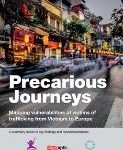
Precarious Journeys: mapping vulnerabilities of victims of trafficking from Vietnam to Europe
ECPAT, Anti-Slavery International, Pacific Links Foundation.
This research was conducted by Every Child Protected Against Trafficking (ECPAT UK), Anti-Slavery International (Anti-Slavery) and Pacific Links Foundation (Pacific Links). Over one and a half years the research investigated the issue of human trafficking from Vietnam to the UK, and through Europe; specifically Poland, the Czech Republic, France and the Netherlands to the UK. This report summarises the main findings of the research. It highlights that whilst there are many vulnerabilities which result in a person leaving Vietnam, vulnerabilities are not inherent in all Vietnamese migrants. Situational and contextual factors can increase vulnerability and risk of trafficking across all aspects of a migrant’s journey from Vietnam to Europe.
Joint submission to the UN Committee on the Elimination of all forms of Discrimination against Women – on the UK
This joint submission to the Committee on the Elimination of all forms of Discrimination against Women by five civil society organisations: Anti-Slavery International, the Anti Trafficking and Labour Exploitation Unit (ATLEU), the Anti-Trafficking Monitoring Group (ATMG), the Human Trafficking Foundation (HTF), and Kalayaan, outlines gaps in UK’s response to modern slavery: including the identification, protection and support provided to victims; barriers in access to legal advice, justice and remedy; and flaws in the legal and policy framework relating to migrant domestic workers, which renders them particularly vulnerable to abuse, exploitation, and trafficking.
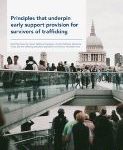
Places of safety: principles that underpin early support provision for survivors of trafficking
Red Cross, Anti-Trafficking Monitoring Group (ATMG), ATLEU, Human Trafficking Foundation.
The Anti-Trafficking Monitoring Group, along with The British Red Cross, ATLEU and The Human Trafficking Foundation have produced a list of 10 core principles in a new guide for services providing Places of Safety and early support for adult survivors. These 10 principles, when taken together, are the minimum standards that are required if Places of Safety are to meet their intended purpose. The principles are complementary and each one is necessary: the absence of any of the principles puts at risk the victim-centred nature of any service. Places of Safety need to be able to evidence their ability to operate a truly victim-centred service. Services should meet national and international legal standards and be able to demonstrate competence.
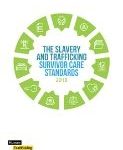
Trafficking survivor care standards
Human Trafficking Foundation (with input from the Anti-Trafficking Monitoring Group)
The trafficking survivor care standards were developed in conjunction with experts in the anti trafficking sector with the aim of providing a blueprint for uk-wide service providers offering high quality care to adult survivors of modern slavery, including trafficking. The standards provide a flexible framework with guiding principles and practical recommendations that support agencies can incorporate into their own existing policies and procedures. The ultimate goal is to promote an integrated, holistic and empowering approach that places the real needs of survivors at the centre of the process of sustained recovery, far beyond the ‘reflection period’.
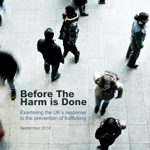
Before the Harm is Done: Examining the UK’s response to the prevention of trafficking
Anti-Trafficking Monitoring Group (ATMG)
The ATMGs report analyses action taken in the UK since 2012, relating to the prevention of human trafficking and the extent to which it contributes to the UK’s implementation of the 2005 Council of Europe Trafficking Convention and the EU Trafficking Directive requirements. The report concludes that the UK lacks an overall strategy to prevent trafficking in adults and children. The UK’s lack of strategic response means that prevention is often seen through the prism and policies of immigration and crime, hindering effective preventative action and leaving adults and children more vulnerable to exploitation.
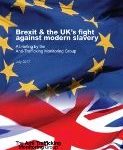
Brexit & the UK’s fight against modern slavery
Anti-Trafficking Monitoring Group.
The following paper considers the potential impact of the UK’s withdrawal (‘Brexit’) from the European Union (EU) on efforts to tackle modern slavery. The purpose of this briefing is to review the extent to which the UK’s membership in the EU has influenced national anti-trafficking efforts, and consider if and how Brexit may impact the UK’s ability to combat modern slavery and protect its victims. Where possible, recommendations have been made on the steps to take to mitigate any potential risks posed by Brexit to UK anti-trafficking efforts.
Joint briefing on Amendment 60 of the Immigration Bill affecting Overseas Domestic Workers
Amendment 60 addressing Overseas Domestic Workers provides a crucial opportunity to protect this vulnerable group from trafficking and slavery. The amendment, proposed by Lord Hylton, implements the key recommendations of a Government commissioned report which found that the right to change employer and to extend leave for 2.5 years are the minimum provisions needed to protect Overseas Domestic Workers from trafficking. It is strongly supported by the Anti Trafficking Monitoring Group, Anti Trafficking and Labour Exploitation Unit, Anti Slavery International, Justice 4 Domestic Workers, Kalayaan, Liberty, Walk Free and Immigration Law Practitioners Association.
ATMG Alternative Modern Slavery Bill
The Anti-Trafficking Monitoring Group (ATMG) has created an Alternative Modern Slavery Bill, to assist in the scrutiny and strengthening of the government’s Modern Slavery Bill currently before the Parliament. At present, the Modern Slavery Bill drafted by the government lacks the necessary provisions to successfully prevent and prosecute modern slavery offences, and protect the victims of these crimes. The provisions contained within this Alternative Bill are those which the ATMG feel are vital for inclusion in UK anti-slavery legislation to ensure it is robust, world-leading and victim-focused. These include a range of offences to capture all forms of modern slavery; comprehensive victim protection measures, including a defence for those who have been forced to commit crimes and a statutory National Referral Mechanism; an Anti-Slavery Commissioner role which has strong powers and a clear independence; and a provision to tackle slavery in supply chains.
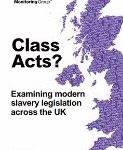
Class Acts? Examining modern slavery legislation across the UK
Anti-Trafficking Monitoring Group.
The report analyses anti-slavery legislation across the UK and highlights significant differences in a number of key areas across the three jurisdictions. In particular the research emphasises how the Modern Slavery Act falls behind the legislation in Scotland and Northern Ireland on victim protection measures. It also points out that there is no monitoring framework in place to oversee the implementation of all three Acts across the UK, including data collection and analysis. As with all of the Group’s reports, the research makes recommendations as to improvements in the UK’s anti-trafficking policy and practice.
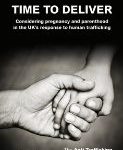
Time to deliver: considering pregnancy and parenthood in the UK’s response to human trafficking
Anti-Trafficking Monitoring Group.
This report analyses how the victims of trafficking who are pregnant or have children are ‘systematically overlooked’ in the UK’s anti-trafficking response. It identifies that support to meet this group’s special needs, such as access to safe and appropriate accommodation, childcare, access to specialist healthcare and support for their children, is not systematically provided. Despite pregnancy and parenthood having an often profound impact on the physical and psychological well-being of trafficking victims, the government’s response to trafficking fails to recognise these individuals as being particularly vulnerable.
ATMG’s submission to the independent review of the Overseas Domestic Workers’ visa
In March 2015 the Minister for Modern Slavery, Karen Bradley, tasked James Ewins QC to undertake an independent review of the Overseas Domestic Worker (ODW) visa. The review includes consideration of:
- Whether the arrangements for issuing ODW Visas are effective in protecting potential victims from abuse
- Whether there is any evidence that the terms of the Visa, including the link to the specified employer, have led to the trafficking or slavery of domestic workers
- Whether the policies or processes for (i) identifying and (ii) providing support to victims of modern slavery amongst those who entered the country on an ODW visa are effective
- Whether the policies and processes for pursuing those accused of perpetrating modern slavery offences against those on an Overseas Domestic Workers Visa are effective
- The need to maintain the integrity of the immigration system.
Submission on the implementation of the EU Trafficking Directive by the UK Government
The UK Government has recently released the report on the implementation of the European Union Trafficking Directive (EU/2011/36) by the UK. The Anti-Trafficking Monitoring Group, which was set up to monitor the implementation of the Directive as well as the Council of Europe Convention on Trafficking in Human Beings, has been critical of the Government’s findings.
Anti-Trafficking Monitoring Group’s Modern Slavery Bill briefings
The following briefings were supported by the Anti Trafficking Monitoring Group shared with parliamentarians to improve the Modern Slavery Bill going through the parliament.
- A briefing on the Independent Anti-Slavery Comissioner; to welcome a government amendment which allows the Commissioner to oversee victim support and assistance, but continue to call for the role to have greater independence from the government and more direct access to Parliament.
- A briefing on victim protection (Clause 49) to support an amendment to create a duty on the State to provide physical, psychological and social recovery to victims, and a separate amendment to provide for the statutory establishment of the National Referral Mechanism (NRM).
- A briefing to call for the inclusion of a separate child exploitation offence to address the potential prosecution gaps that may result from the existing offences.
- A briefing to welcome the government’s amendments to clause 48 which give child trafficking advocates full legal powers and to seek assurance from the Minister that the provision of advocates will not be dependent on a positive NRM decision.
- A briefing in support of an amendment to reinstate protections for Overseas Domestic Workers (ODWs), to allow them to change employer, renew their visa and be entitled to a 3-month temporary visa to find an alternative place of (domestic) work if they leave an abusive employment situation.
- A briefing which calls for the statutory defence to be strengthened to ensure it works effectively for children, specifically by removing the ‘Reasonable Person Test’.
- A briefing in support of an amendment to Clause 47 to ensure that legal aid could be provided to a person before an application had been made to the National Referral Mechanism (NRM) competent authority or before the competent authority had reached its NRM decision.
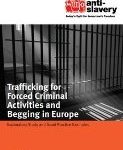
Trafficking for Forced Criminal Activities and Begging in Europe
RACE in Europe Project, lead by Anti-Slavery International.
This report analyses the phenomenon of trafficking into crime such as cannabis cultivation, ATM theft, pickpocketing, bag-snatching, counterfeit DVD selling, benefit fraud and forced sham marriage, as well as being forced to beg. The report explores the situation in the project partner countries (Ireland, the UK, the Czech Republic, and the Netherlands) and provides an overview of the rest of Europe. It exposes the dearth of systematic information and awareness about this type of exploitation amongst the policy makers and justice system actors with very few cases reported in official statistics and many victims misidentified as offenders.
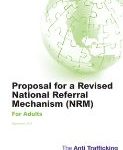
ATMG National Referral Mechanism for adults and children
Anti-Trafficking Monitoring Group.
The Anti-Trafficking Monitoring Group has created proposals for a revised National Referral Mechanism (NRM), one for adults and a separate one for children, to assist the Home Office in its ongoing review of the current system. The NRM is the process through which victims of trafficking are formally identified and supported and has been in place in the UK since 2009. After it was established, the ATMG has raised concerns about the way in which it operates and has highlighted these in its research reports. The proposed models address these issues and provide workable solutions to them.
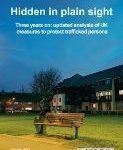
Hidden in plain sight: three years on: an updated analysis of UK measures to protect trafficked persons
Anti-Trafficking Monitoring Group.
Fourth report in the ATMG series analyses the UK’s response to trafficking four years on from the Council Of Europe anti-trafficking convention coming into force. Whilst there has been a number of improvement in the government’s response to trafficking through the National Referral Mechanism (NRM), the system fails to systematically identify, assist and protect victims of trafficking. The report highlights major problems of the UK’s system, especially looking at victims of trafficking through context of their immigration status, causing the decision making to be unfair and discriminatory.
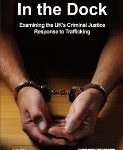
In the Dock: Examining the UK’s Criminal Justice Response to Trafficking
Anti-Trafficking Monitoring Group
This report examines the effectiveness of the UK’s Criminal Justice System’s (CJS) response to trafficking in terms of law, policy and practice. The report found that, in spite of localised examples of good practice, the CJS fails to systematically prosecute traffickers and protect victims’ rights. Despite the Government’s claims to make the UK a “hostile environment” for traffickers, human trafficking is not a policing priority.
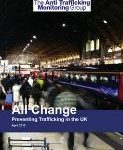
All Change: Preventing trafficking in the UK
Anti-Trafficking Monitoring Group.
The new report from The Anti-Trafficking Monitoring Group is the result of research carried out between 2010 and 2011 with the aim of examining trafficking prevention in the UK in accordance with the Government’s obligations under the Council of Europe Convention on Action against Trafficking in Human Beings. In particular, it assesses measures instigated by the UK Government to prevent trafficking/re-trafficking, highlights good practice in prevention programming and offers recommendations to strengthen the UK’s ability to prevent trafficking in the future.
Sarah Edwards (with contribution from Rachel Annison).
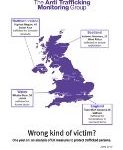
Wrong kind of victim?: one year on: an analysis of UK measures to protect trafficked persons
Anti-Trafficking Monitoring Group; Lorena Arocha; Mike Dottridge
This report by the Anti-Trafficking Monitoring Group looks at the government’s flagship ‘National Referral Mechanism’ and concludes that the UK’s new anti-trafficking measures are “not fit for purpose” and the Government is breaching its obligations under the European Convention against Trafficking. It also finds that the current system places too much emphasis on the immigration status of trafficked people rather than focusing on protecting the victims of this traumatic crime. The report also includes recommendations for the Government to reform the system.
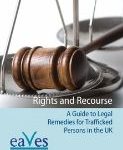
Rights and Recourse: A Guide to Legal Remedies for Trafficked Persons in the UK
Anti-Slavery International and Eaves Poppy Project
Legal guide by Anti-Slavery International and Eaves Poppy Project warns that victims of trafficking for forced prostitution and forced labour are vulnerable to being re-trafficked because of a failure of the criminal justice system to provide financial compensation for their ordeal. The guide aims to be a starting point to help lawyers take a creative and comprehensive approach in evaluating the legal remedies available to trafficking victims. It also includes two practical case studies and recommendations drawn from the experience of several practitioners in the system.
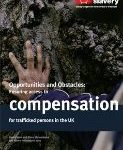
Opportunities and Obstacles: Ensuring access to compensation for trafficked persons in the UK
Anti-Slavery International
Although there has been an increase in the number of convictions for humantrafficking in the UK, legal remedies and compensation for traffickedpersons have remained inaccessible. This report identifies the legalremedies available to trafficked persons in England andWales andanalyses the effectiveness of each remedy viewed in light of itsaccessibility to trafficked persons.
Janice Lam & Klára Skrivánková
Missing Out: A Study of Child Trafficking in the North-West, North-East and West Midlands
Christine Beddoe, ECPAT UK
The report highlights the cases of 80 children known or suspected of being trafficked into the UK for sexual exploitation, labour exploitation and forced marriage. More shocking is that 48 of these children have gone missing from social services care and have never been found.
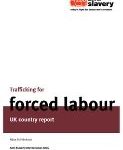
Trafficking for Forced Labour: UK Country Report
Klára Skrivánková, Anti-Slavery International
The result of research carried out by Anti-Slavery International between 2005 and 2006 with the aim of finding out more about trafficking for forced labour in the United Kingdom. This was a qualitative rather than quantative project, which aimed to provide information about how migrants become trafficked and which industries in the UK are affected. Also available an executive summary and policy recommendations.
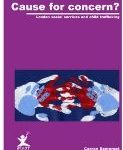
Cause for concern?: London social services and child trafficking
ECPAT UK.
ECPAT UK’s latest report on child trafficking into the UK. Cause for Concern? includes interviews with social services in all 33 of London’s boroughs to gauge social workers’ awareness of trafficking and record cases of children who have been trafficked to the capital. Twenty-six boroughs reported that they had worked directly with children who had been trafficked or who had been brought into the UK and were living in suspicious circumstances. It includes case studies, statistics and recommendations.